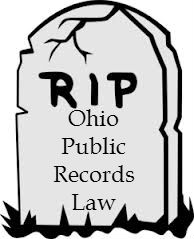RIP Ohio’s public records law

By Maggie Thurber | for Ohio Watchdog
RIP: An Ohio Supreme Court ruling takes all the teeth out of what used to be an excellent public records law.
The Ohio public records law is essentially dead, killed by a February ruling of the Ohio Supreme Court.
For more than a decade, Ohio has boasted of its citizen-friendly public records law. From the rules placed on public offices to the fine of up to $1,000 for failing to produce records, the law has helped people know exactly what’s going on, and how their money is spent.
But as good as the terms of the law were, the hammer hanging over the heads of public officials was the provision that would pay attorney fees if they failed to respond to a public records request.
That hammer is gone, as decreed by the Ohio Supreme Court ruling in two cases.
In 2011, Emilie DiFranco wanted to know about a new playground in the city of South Euclid. She made two separate public records requests. After waiting six and eight months, respectively, without a response, she filed an action to force production of the records.
In September 2012, the 8th District Court of Appeals dismissed her case, since all records eventually were produced, and declined to award the $100-per-day damages and attorney fees. DiFranco appealed the decision on damages and fees to the Supreme Court, which ruled unanimously that DiFranco was entitled to the damages. But in a 6-1 decision issued nearly a year after hearing arguments in the case, the court wrote attorney fees were not payable because of the presence of six little words.
You see, in 2007, the Ohio General Assembly amended the law to set specific requirements for awarding attorney fees.
The Supreme Court examined the amended language and based its opinion on the phrase: “if the court renders a judgment.”
The amended law said that “if the court renders a judgment,” the court may award reasonable attorney fees. In a separate sentence, the law said, “the court shall award reasonable attorney’s fees” if either of two conditions are met — that the public office failed to respond or they promised the records and failed to deliver them.
Six justices decided that mandatory attorney fees are only payable when the court actually renders a decision.
They wrote:
“The first sentence covers discretionary fees, which are to be awarded “(i)f the court renders a judgment that orders” production of records. Mandatory fees are covered in the second sentence and are awarded if one of two conditions exists. The question therefore arises whether the if clause of the first sentence applies to the second sentence, as well. This is especially important here, because the court below did not have to “render a judgment;” rather, the city produced the records immediately on discovering DiFranco filed a mandamus case.
“We hold that the if clause applies to both sentences. If the General Assembly had intended for mandatory attorney fees to be independent of the prerequisite of a judgment, it would have included them as a separate paragraph.”
So since DiFranco never got a decision from the court, no attorneys fees.
The effect of this ruling is two-fold.
First, public entities can delay and stonewall any public records request knowing they can acquiesce at the last-minute and face only a maximum penalty of $1,000.
Second, ordinary people will be unlikely to file mandamus actions because they simply can’t afford them.
“This case involves unreasonable conduct by South Euclid,” Justice Sharon Kennedy dissented. “And that misconduct delayed the production of records and forced DiFranco to initiate litigation to enforce her public-records request. By denying the fees, the court again defeats the purpose of mandatory fees: to make the requester whole when unreasonable delay has necessitated litigation.”
The Ohio Newspaper Association blasted the decision.
“This is not what the legislature intended in the 2007 amendments that were designed to liberalize the public records law, or what the language of the statute provides,” ONA counsel Louis Colombo said in a news release issued by the group.
Dennis Hetzel, executive director of the ONA, vowed to seek legislative action to “correct the impact of this decision even though we believe the current law is quite clear.”
COAST, the Cincinnati group that routinely uses the public records law, also took a stand against the decision. In an email to supporters, it wrote:
“We have a Republican Ohio Supreme Court that has enacted this gross injustice not just to a Plaintiff, but to an important law. We have a Republican House and a Republican Senate. We have a Republican Governor. If they refuse to fix this, they do not deserve to continue to serve in office, period.”
The Supreme Court opinions:
2012-1704. State ex rel. DiFranco v. S. Euclid, Slip Opinion No. 2014-Ohio-538
2012-1893. State ex rel. DiFranco v. S. Euclid, Slip Opinion No. 2014-Ohio-539
The post RIP Ohio’s public records law appeared first on Watchdog.org.







